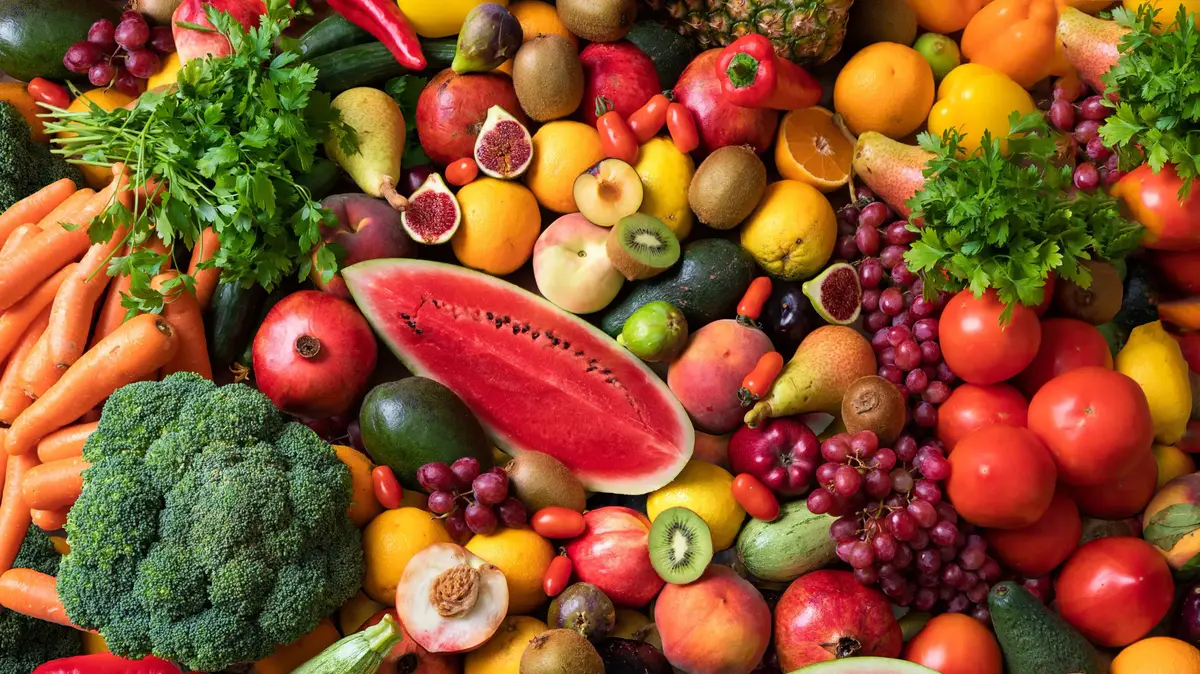health
Nutrition and diet
Preventive nutrition
The question is not just how much fruit you should eat, but what
Most of us know that fruits and vegetables are essential for a healthy diet, but do you have any idea which ones are recommended and which ones are less so?
New research is trying to answer that answer
Tags
fruits
vegetables
diet
Walla!
health
Thursday, 04 March 2021, 12:14
Share on Facebook
Share on WhatsApp
Share on general
Share on general
Share on Twitter
Share on Email
0 comments
How much to eat of each type?
Fruits and vegetables (Photo: ShutterStock)
Fruits and vegetables are undoubtedly an integral part of a healthy diet, but how many of them should we eat?
And perhaps more importantly - which one should we put on the menu?
According to a new study published by the American Heart Association (AHA), which analyzed data representing nearly 2 million adults worldwide, it was found that adults should eat 5 servings of vegetables and fruits.
But, it has a clear division - two of the five dishes should be fruit - the other three should focus on vegetables.
More on Walla!
Why is a salad as unhealthy as you thought?
To the full article
"This division is likely to bring the most benefit in terms of chronic disease prevention and is a relatively achievable need for the general public," editor-in-chief Dr Dong Wang, an epidemiologist and nutritionist at Harvard Medical School and Brigham Hospital and Women's Hospital, said in a statement.
More on Walla!
This is what you must know about the fruits and vegetables you eat
7 signs that you are not eating enough vegetables
Cooked or fresh: how should you eat these vegetables?
To be successful in psychometrics you need a method and all universities recommend it
The researchers found differences in the benefits we get from different fruits and vegetables.
"We also found that not all fruits and vegetables offer the same level of benefit, although current dietary recommendations generally refer to all types of fruits and vegetables, including starchy vegetables, fruit juices and potatoes, as such," Wang said.
Peas, corn, potatoes and other starchy vegetables, for example, were not associated with a reduced risk of death or specific chronic disease.
Green leafy vegetables rich in beta carotene and vitamin C, such as spinach, leafy green lettuce and cabbage, along with carrots, however, presented benefits.
In the fruit category, fruits loaded with beta carotene and vitamin C, like berries of all kinds and citrus fruits, have also helped reduce the risk of death and chronic diseases.
However, fruit juice does not.
Previous studies have found that whole fruit fiber is the key to all the benefits.
To reduce the risk of death and chronic diseases.
Berries (Photo: Reut Sahar, Reut Sahar)
The study, published this week in the AHA's Circulation Journal, was large and conducted in two parts.
The first was a data analysis from the Nurses' Health Study and the Health Professionals Surveillance Study, which followed more than 100,000 American men and women for up to 30 years.
All participants completed a food habits questionnaire at the beginning of the study and these questionnaires were updated once every two to four years.
This information was then compared to health and death records collected during the long-term studies.
The second part of the study was a meta-analysis of consolidated data from 26 studies that covered nearly 2 million participants from 29 countries and territories in Asia, Africa, Australia, Europe and North and South America.
These studies also compared fruit and vegetable consumption with mortality rates.
People who ate five servings of fruits and vegetables a day were 13 percent less likely to die from any cause than people who ate only two servings of fruits and vegetables a day.
Eating five servings has also been linked to a 12 percent lower risk of death from cardiovascular disease, including heart disease and stroke.
The study found that there was also a 10 percent lower risk of death from cancer and a lower risk of death from respiratory diseases, such as chronic obstructive pulmonary disease (COPD), than those who ate only two servings of fruit a day.
Prevention of millions of deaths a year
Oddly enough, the study found no benefit in prolonging life by eating more than five servings a day of fruits and vegetables, as opposed to a study conducted in 2017 by Imperial College London.
A study then claimed that eating 10 servings of fruits and vegetables a day provides a significant benefit in reducing the chance of heart attack, stroke, cancer and premature death.
The researchers, whose study was published in the International Journal of Epidemiology, claimed that consuming about ten servings a day could potentially prevent some 7.8 million deaths a year worldwide.
"The American Heart Association recommends filling at least half a plate of fruits and vegetables at each meal," said Dr. Ann Thorndike, chair of the American Heart Association's Nutrition Committee. "This study provides strong evidence of the benefits of eating fruits and vegetables and suggests a target amount to consume daily for ideal health. ", She added.
Share on Facebook
Share on WhatsApp
Share on general
Share on general
Share on Twitter
Share on Email
0 comments













